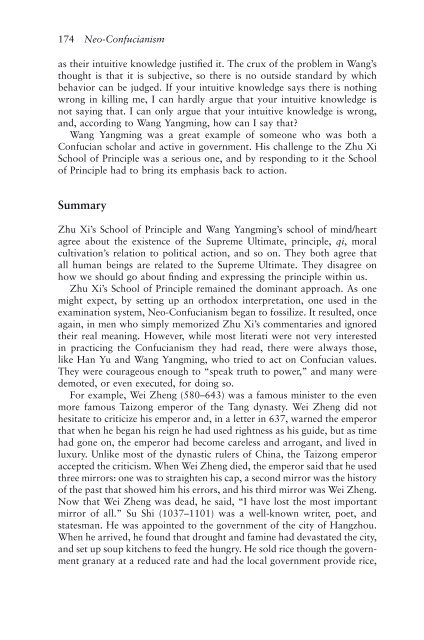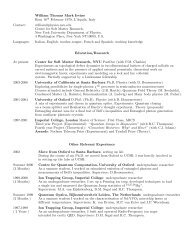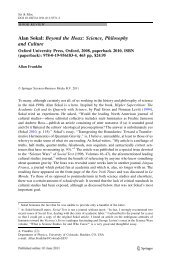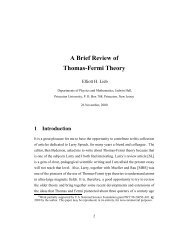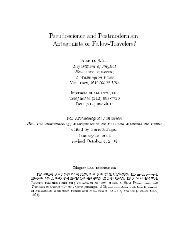- Page 3:
Confucius and Confucianism
- Page 7:
For my mother and father,Phyllis Ma
- Page 13 and 14:
List of Illustrations1.1 Traditiona
- Page 15 and 16:
Preface: Why Confucius? xiiiI can s
- Page 17:
Chronology16th to 11th century BCE:
- Page 20 and 21:
2 Confucius’ World and His LifeWe
- Page 22 and 23:
4 Confucius’ World and His LifeAn
- Page 24 and 25:
6 Confucius’ World and His Lifesi
- Page 26 and 27:
8 Confucius’ World and His Lifewa
- Page 28 and 29:
10 Confucius’ World and His LifeS
- Page 30 and 31:
12 Confucius’ World and His LifeF
- Page 32 and 33:
Yellow RiverYANBeijingQINSubdivided
- Page 34 and 35:
16 Confucius’ World and His Lifer
- Page 36 and 37:
18 Confucius’ World and His Lifeo
- Page 38 and 39:
20 Confucius’ World and His Lifeb
- Page 40 and 41:
22 Confucius’ World and His Lifef
- Page 42 and 43:
24 Teachings I: The Foundation of a
- Page 44 and 45:
26 Teachings I: The Foundation of a
- Page 46 and 47:
28 Teachings I: The Foundation of a
- Page 48 and 49:
30 Teachings I: The Foundation of a
- Page 50 and 51:
32 Teachings I: The Foundation of a
- Page 52 and 53:
34 Teachings I: The Foundation of a
- Page 54 and 55:
36 Teachings I: The Foundation of a
- Page 56 and 57:
38 Teachings I: The Foundation of a
- Page 58 and 59:
40 Teachings I: The Foundation of a
- Page 60 and 61:
42 Teachings I: The Foundation of a
- Page 62 and 63:
44 Teachings I: The Foundation of a
- Page 64 and 65:
46 Teachings II: The Foundation of
- Page 66 and 67:
48 Teachings II: The Foundation of
- Page 68 and 69:
50 Teachings II: The Foundation of
- Page 70 and 71:
52 Teachings II: The Foundation of
- Page 72 and 73:
54 Teachings II: The Foundation of
- Page 74 and 75:
56 Teachings II: The Foundation of
- Page 76 and 77:
58 Teachings II: The Foundation of
- Page 78 and 79:
60 Teachings II: The Foundation of
- Page 80 and 81:
62 Teachings II: The Foundation of
- Page 82 and 83:
64 Terms, and Mozithey tried to get
- Page 84 and 85:
66 Terms, and Mozipart of the Sprin
- Page 86 and 87:
68 Terms, and Mozithose who argued
- Page 88 and 89:
70 Terms, and Mozihe walked from on
- Page 90 and 91:
72 Terms, and Mozisage - kings were
- Page 92 and 93:
74 Terms, and Mozicontinued to supp
- Page 94 and 95:
76 OpponentsThe second text, the Zh
- Page 96 and 97:
78 Opponentsthat can be thrown away
- Page 98 and 99:
80 Opponentspoint of view, which I
- Page 100 and 101:
82 OpponentsThe Logicians 22The Log
- Page 102 and 103:
84 OpponentsShang Yang or Lord Shan
- Page 104 and 105:
86 Opponentsbecome immortal. Some a
- Page 106 and 107:
88 MenciusFigure 6.1 Statue of Menc
- Page 108 and 109:
90 Menciuspoint of view. There is n
- Page 110 and 111:
92 MenciusIf we all begin with the
- Page 112 and 113:
94 Menciusmay be shaped by the fami
- Page 114 and 115:
96 MenciusGovernmentMencius underst
- Page 116 and 117:
98 Menciuswithin them. A bad econom
- Page 118 and 119:
100 MenciusA basket of food and a b
- Page 120 and 121:
102 MenciusMencius immediately dism
- Page 122 and 123:
104 Menciusdimension: it must be ac
- Page 124 and 125:
106 XunziLanling in the state of Ch
- Page 126 and 127:
108 XunziWhen emotions and desires
- Page 128 and 129:
110 XunziThe sage - kings realized
- Page 130 and 131:
112 XunziIn their greed for money,
- Page 132 and 133:
114 XunziHeavenIn the early Zhou dy
- Page 134 and 135:
116 XunziAlways when people see gho
- Page 136 and 137:
118 XunziXunzi saw other thinkers a
- Page 138 and 139:
120 Confucians, “Confucian” Tex
- Page 140 and 141:
122 Confucians, “Confucian” Tex
- Page 142 and 143: 124 Confucians, “Confucian” Tex
- Page 144 and 145: 126 Confucians, “Confucian” Tex
- Page 146 and 147: 128 Confucians, “Confucian” Tex
- Page 148 and 149: 130 Confucians, “Confucian” Tex
- Page 150 and 151: 9The Han Dynasty,206 BCE - 220 CE 1
- Page 152 and 153: 134 The Han Dynasty, 206 BCE-220 CE
- Page 154 and 155: 136 The Han Dynasty, 206 BCE-220 CE
- Page 156 and 157: 138 The Han Dynasty, 206 BCE-220 CE
- Page 158 and 159: 140 The Han Dynasty, 206 BCE-220 CE
- Page 160 and 161: 142 The Han Dynasty, 206 BCE-220 CE
- Page 162 and 163: 144 The Han Dynasty, 206 BCE-220 CE
- Page 164 and 165: 10From the Han to the TangDynasties
- Page 166 and 167: 148 From the Han to the Tang Dynast
- Page 168 and 169: 150 From the Han to the Tang Dynast
- Page 170 and 171: 152 From the Han to the Tang Dynast
- Page 172 and 173: 154 From the Han to the Tang Dynast
- Page 174 and 175: 156 From the Han to the Tang Dynast
- Page 176 and 177: 158 From the Han to the Tang Dynast
- Page 178 and 179: 160 Neo-ConfucianismEven with the l
- Page 180 and 181: 162 Neo-Confucianismment was spendi
- Page 182 and 183: 164 Neo-Confucianismnot real. Buddh
- Page 184 and 185: 166 Neo-Confucianismprinciple for a
- Page 186 and 187: 168 Neo-Confucianismhave an exhaust
- Page 188 and 189: 170 Neo-Confucianismlocal gazettes
- Page 190 and 191: 172 Neo-Confucianismextensive corre
- Page 194 and 195: 12Confucianism and ModernityThe Qin
- Page 196 and 197: 178 Confucianism and Modernity“ o
- Page 198 and 199: 180 Confucianism and ModernityThe M
- Page 200 and 201: 182 Confucianism and ModernityOne o
- Page 202 and 203: 184 Confucianism and Modernitysuper
- Page 204 and 205: 186 Confucianism and ModernityIf Co
- Page 206 and 207: 188 Confucianism and ModernityRevol
- Page 208 and 209: 190 Confucianism and Modernityagree
- Page 210 and 211: 13IssuesWhat is Confucianism?By now
- Page 212 and 213: 194 Issueswe have within us the pos
- Page 214 and 215: 196 Issueswho are “ just ” gett
- Page 216 and 217: 198 IssuesSelf - cultivationThe Con
- Page 218 and 219: 200 Issuesdaughters had their feet
- Page 220 and 221: 202 IssuesHow this will play out is
- Page 222 and 223: 204 Issuesuniformly, tried to pract
- Page 224 and 225: 206 Issuesout history. We might wan
- Page 226 and 227: 208 Notes8 The Book of History ,
- Page 228 and 229: 210 Notes36 Analects 7.14. The Shi
- Page 230 and 231: 212 Notesexample of the debate abou
- Page 232 and 233: 214 Notes5 Analects 13.3.6 Analects
- Page 234 and 235: 216 NotesNotes to Chapter 41 “ Sc
- Page 236 and 237: 218 Notes24 “ Universal love ”
- Page 238 and 239: 220 Notes23 See the Mohist Canons,
- Page 240 and 241: 222 NotesMencius wanted the ministe
- Page 242 and 243:
224 Notes30 Xunzi , “ On Getting
- Page 244 and 245:
226 Notes17 Mencius 3B. 9.18 Spring
- Page 246 and 247:
228 Notes5 Keith N. Knapp, Selfless
- Page 248 and 249:
230 NotesNotes to Chapter 101 Down
- Page 250 and 251:
232 Notes20 See Grayson, 178f.21 Se
- Page 252 and 253:
234 Notes14 Bettine Birge, Women, P
- Page 254 and 255:
236 Notes20 Umberto Bresciani, Rein
- Page 256 and 257:
238 Notesof charges is that it is s
- Page 258 and 259:
240 Notes17 Such as Voltaire, Monte
- Page 260 and 261:
242 Glossary of Names and TermsEngl
- Page 262 and 263:
244 Glossary of Names and TermsEngl
- Page 264 and 265:
246 Glossary of Names and TermsEngl
- Page 266 and 267:
248 Glossary of Names and TermsEngl
- Page 268 and 269:
250 Suggestions for Further Reading
- Page 270 and 271:
252 Suggestions for Further Reading
- Page 272 and 273:
254 BibliographyCsikszentmihalyi ,
- Page 274 and 275:
256 BibliographyNeville , Robert .
- Page 276 and 277:
IndexAdmonitions for Women 143, 199
- Page 278 and 279:
260 IndexHeaven 4-5, 12, 29, 60-1,
- Page 280:
262 IndexSunzi Bingfa, The Art of W


